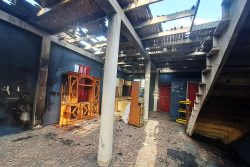Dear Editor,
In your report ‘Three hectares proposal eases mining fears’ (SN, February 12), you quote or re-state two sentences from the President’s address to miners at the Liliendaal International Convention Centre on February 11 where the reasoning does not seem to accord with the MoU which the President signed just three months ago. “He [the President] said that the administration has decided that Guyana will keep deforestation at minimum historic levels so this allows Guyana enough space not just to continue mining but to expand mining.” The minimum historic level is of course zero, because at the time of first European contact the Amerindian style of land use did not cause deforestation, in the current sense of permanent change in land cover.
Perhaps the President meant that the level is that determined with extraordinary precision by the Guyana Forestry Commission in 2007-08, of 24,428 ha deforested due to mining? Perhaps the President meant the 2400 ha estimated by the Guyana Gold and Diamond Miners Association? Either way, if the proposal for GFC-approved logging in advance of mining is implemented, then the logs extracted will increase Guyana’s total log volume production. This will run against one of the indicators in Table 1 of the Joint Concept Note attached to the Norway-Guyana MoU – “Increases in total extracted volume (as compared to mean volume 2003-2008) will be accounted as increased forest carbon emissions” – and so will result in financial penalties from Norway. Neither the President nor his ad hoc Special Land Use Committee has commented on this contradiction. The revised Low Carbon Development Strategy (December 2009, page 39) assures large-scale loggers that they can continue business as usual, so there will not be a compensating reduction in log production from that sub-sector.
Secondly, you report the President as “noting the global carbon market, responded [to the proposal for mining lands to be excluded from areas covered by the Norway-Guyana MoU] that setting aside the land is ‘clearly not a feasible option’ because of its structure.” However, the President recognized that titled Amerindian Village Lands were not automatically included in the areas covered by that MoU. Why then is a mining reserve or reserves not a feasible option? It is for the legal owners of forest carbon to decide how much forest they put into carbon trading agreements, so it is entirely feasible for Guyana to decide what State Land and State Forest areas should be included in the MoU and the World Bank’s Forest Carbon Partnership Facility arrangements. Especially as the Guyana Forestry Commission can detect and measure mining areas with such precision.
One might imagine that a more open and strategic process of public debate in the LCDS multi-stakeholder steering committee would have considered such issues months ago. The Minister of Finance in his 2010 budget speech noted that the President will continue to chair this committee.
Yours faithfully,
Janette Bulkan






